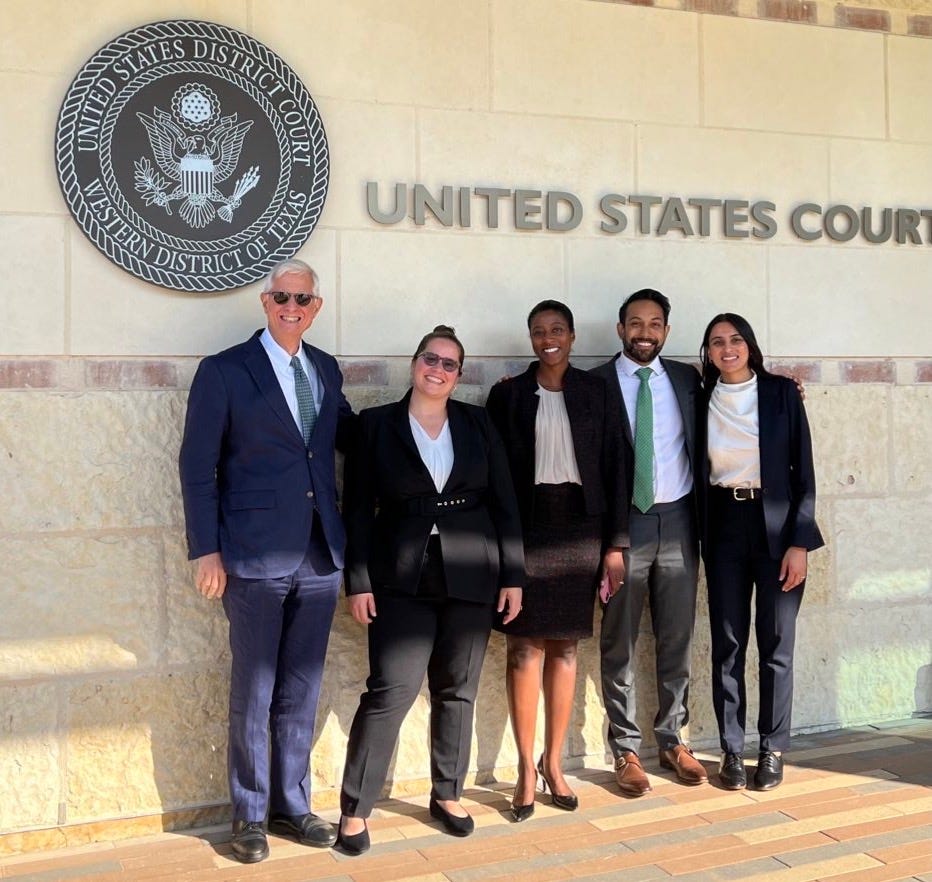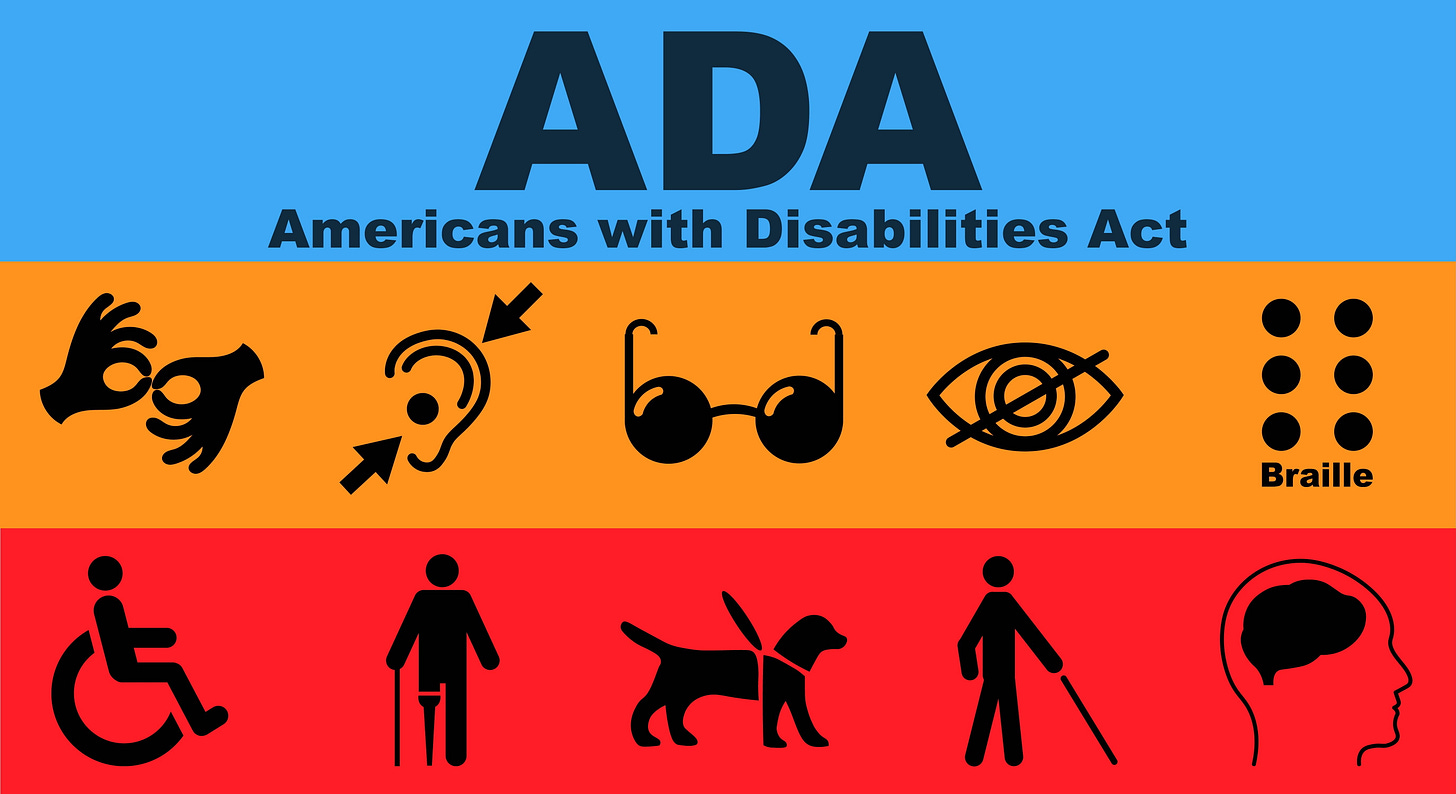The Often-Overlooked Links Between the Americans with Disabilities Act & Voting Rights
IN BRIEF: On July 26, America commemorated the 35th anniversary of President George H. W. Bush signing the Americans with Disabilities Act (ADA) into law — the world's first comprehensive civil rights law for people with disabilities.
The ADA bars discrimination based on disability and guarantees equal access to public buildings and businesses, employment opportunities, transportation, communications services, commercial facilities, and state and local government services, including voting processes.
Accessibility movements and voting rights movements intertwine across
American history. As advocates and organizations continue to push to increase access to polling places, physical ballots, and more, it’s crucial for Americans to understand why accessibility must be a consideration when modernizing and/or defending voting policies and practices.
WHY IT MATTERS: Accessibility is a critical piece within the puzzle of American democracy. Whether it’s being able to receive support in reading their ballot, enter a polling place using a ramp, or receive assistance with their ballot if they have a physical disability, ensuring that every voter has an equal opportunity to cast a ballot is paramount.
One in four Black adults has a disability. In order to ensure all Black voters can exercise their political power, accessibility concerns must be considered.
When accessibility is restricted for people with disabilities, we set our democracy back. And yet, there are efforts underway to do just that. For example, through 2018, hundreds of polling place closures were documented in the wake of the Supreme Court’s Shelby County v. Holder decision. This decision severely weakened a crucial provision of the Voting Rights Act that would’ve required polling site closures to be federally approved before they were eliminated. Abrupt changes in polling places can severely limit people with disabilities’ ability to cast their ballots, as the changes may disrupt travel, physical access, and timing plans.
With the Shelby decision, the court opened the door for a bevy of suppressive voting laws that do not take into account disability and racial vote dilution tactics that have severely harmed Black voter power. In fact, just this week, the Eight Circuit U.S. Court of Appeals ruled that there is no private right of action for Voting Rights Act claims under Section 208, meaning private individuals and organizations in the seven states under the 8th Circuit’s jurisdiction cannot bring voting rights cases under a section of the law that allows others to assist voters who are blind, have disabilities, or are unable to read.
LDF AT WORK: LDF has worked for decades to ensure that all eligible voters have access to the polls. For example, in Texas, LDF filed a lawsuit on behalf of the Houston Area Urban League, Delta Sigma Theta Sorority, Inc., The Arc of Texas, and an individual who had previously served as an election judge, challenging multiple provisions of SB1, a voting bill passed in 2021. Other disability rights and civil rights organizations also challenged the law in companion lawsuits.
In October 2024, the court issued an opinion on the claims brought in the lawsuit under Section 208 of the Voting Rights Act. It found that SB1’s requirement that people assisting voters with disabilities disclose additional information before helping voters cast their ballots unlawfully burdened eligible voters’ right to vote with assistance from a person of their choice. The court also found that some of the changes SB1 made to the oath that certain assistors must take before they can help voters limit voters’ ability to receive the assistance they need to meaningfully exercise their right to vote.
In March 2025, the court also found that SB1’s identification requirements for individuals voting by mail discriminate against voters with disabilities, violating the ADA and Section 504 of the Rehabilitation Act. Both of these court decisions were major wins in a long fight at the intersection of disability and voting rights.

In Louisiana, LDF has also worked to reduce the harm to voters with disabilities caused by abrupt and unjustified polling place closures. During the 2024 legislative session, LDF and a local partner, the Power Coalition, proposed HB 319, which requires the secretary of state to make information about poll site changes available online in a “sortable format.” HB 319 was built on a previous bill that LDF successfully worked to enact, which required all poll site changes in the state to be posted on the Louisiana Secretary of State’s website.
HB 319 also requires Louisiana localities to identify and publicly post the reason for a poll site change, which allows voters to have a clear understanding of not only where, but why their poll site was relocated. This information will aid voters with disabilities and hopefully put an end to voters missing their chance to cast a ballot because they weren’t aware of polling place changes. The bill was signed into law on June 3, 2024, and became effective on July 1, 2025.
Beyond its litigation, legislation, and advocacy work, LDF-led teams work on the ground during election seasons to observe election practices in focus states. These teams raise alarms and seek remedies when accessibility law is not followed during elections.
When access is threatened, it hurts all of us. Every eligible voter must be able to participate in our electoral process to achieve the full potential of our multiracial democracy.







